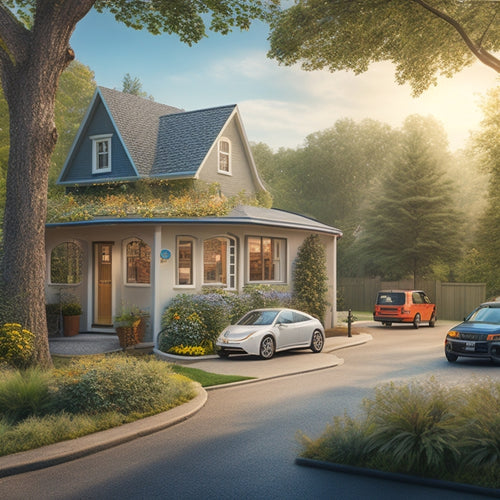
What Expenses Should I Consider for the Cost to Install Solar Panels on Your Home
Share
As you're planning to install solar panels on your home, don't forget to factor in key expenses beyond the panel cost itself. You'll need to contemplate system design and installation costs, equipment and material expenses, permits and inspection fees, as well as any necessary roofing and structural upgrades. Additional features and upgrades, like energy storage solutions and monitoring systems, will also impact your total investment. These expenses can add up, but understanding each component's cost will help you make informed decisions. To get a clearer image of what to expect, contemplate each of these factors and how they'll impact your overall project budget.
Key Takeaways
- System design and installation costs vary depending on roof orientation, shading, and size, with average costs ranging from $2.50 to $3.50 per watt.
- Equipment and material expenses include solar panel type, energy storage solutions, mounting hardware, inverters, and monitoring systems, which impact overall efficiency and effectiveness.
- Permits and inspection fees, ranging from $500 to $2,000, are necessary for compliance with local building, electrical codes, and zoning regulations.
- Roofing and structural upgrades, including repairs, replacement, and reinforcement, may be required to ensure solar panel longevity and feasibility.
- Additional features and upgrades, such as battery storage, monitoring systems, and remote monitoring capabilities, can improve overall system efficiency and performance.
System Design and Installation Costs
When planning to install solar panels, your system design and installation costs are a vital factor to contemplate. These expenses will notably impact your overall investment, and it's important to understand what contributes to them. A well-designed system guarantees optimal system efficiency, which directly affects your energy savings.
A professional installer will assess your roof's orientation, shading, and size to determine the ideal system configuration. This evaluation process influences your installation timeline, which typically ranges from a few days to several weeks, depending on the complexity of the project.
Installation costs vary depending on the installer's proficiency, labor rates, and local permits required. On average, you can expect to pay between $2.50 and $3.50 per watt, with a typical residential system ranging from 5 to 10 kilowatts.
Considering these factors, it's important to research and compare quotes from different installers to guarantee you're getting the best value for your money. By doing so, you'll be well on your way to utilizing the power of solar energy while keeping your costs in check.
Equipment and Material Expenses
Beyond the system design and installation costs, the equipment and material expenses are another critical aspect to assess in your solar panel investment.
You'll want to contemplate the type and quality of equipment you need to guarantee your system operates efficiently and effectively.
When evaluating equipment and material expenses, reflect on the following:
-
Solar panel types: The type of solar panels you choose will greatly influence your overall cost. Monocrystalline, polycrystalline, and thin-film solar panels vary in efficiency, durability, and price.
-
Energy storage: If you plan to store excess energy generated during the day for nighttime use, you'll need to factor in the cost of batteries and other energy storage solutions.
-
Mounting hardware: The cost of racking and mounting systems, which secure your solar panels to your roof or ground, will depend on the type and complexity of your installation.
- Inverters and monitoring systems: Inverters convert DC power from your solar panels to AC power for your home, while monitoring systems track your energy production and consumption.
Permits and Inspection Fees
How much red tape are you prepared to maneuver to get your solar panel system up and running? Obtaining the necessary permits and undergoing inspections are vital steps in the installation process.
You'll need to comply with local building codes, electrical codes, and zoning regulations, which may vary depending on your location. Typically, permit requirements include electrical permits, building permits, and sometimes, zoning permits.
You may also need to obtain a permit from your utility company to connect your solar panel system to the grid. The cost of these permits can range from $500 to $2,000, depending on the complexity of your project and the jurisdiction.
Inspection processes are also a significant aspect of the installation process. Inspectors will verify that your solar panel system meets local building and electrical codes.
You may need to undergo multiple inspections, including a pre-installation inspection, a mid-installation inspection, and a final inspection. Inspection fees can add up quickly, ranging from $300 to $1,500.
It's important to factor these costs into your overall budget to avoid unexpected surprises.
Roofing and Structural Upgrades
Your roof's condition plays a critical role in determining the feasibility of your solar panel installation. A roof in poor condition can compromise the solar panel longevity, making it crucial to evaluate its condition before installation.
If your roof requires repairs or replacement, you'll need to factor these costs into your overall budget.
You may need to take into account the following roofing and structural upgrades:
-
Roof repairs or replacement: If your roof is damaged, aged, or near the end of its lifespan, you may need to repair or replace it before installing solar panels.
-
Roof reinforcement: If your roof's structure is weak, you may need to reinforce it to support the weight of the solar panels.
-
Roof orientation adjustment: If your roof's orientation isn't ideal for solar panel installation, you may need to adjust it to maximize energy production.
- Structural modifications: In some cases, you may need to modify your home's structure to accommodate the solar panels, such as installing additional support beams.
Keep in mind that these upgrades can considerably impact the overall cost of your solar panel installation.
Be sure to discuss these potential costs with your solar panel installer to ascertain you're prepared for any necessary upgrades.
Additional Features and Upgrades
Installing solar panels can be a significant investment, and you may want to contemplate additional features and upgrades to enhance their performance and efficiency.
These upgrades can provide you with more control over your energy production and consumption, as well as increased peace of mind.
One popular upgrade is battery storage, which allows you to store excess energy generated by your solar panels during the day for use at night or during power outages.
This can be particularly useful if you live in an area prone to frequent outages or if you want to reduce your reliance on the grid.
Another beneficial upgrade is a monitoring system, which provides real-time data on your energy production and consumption.
This can help you identify areas for improvement and optimize your energy usage.
Some monitoring systems also offer remote monitoring and alerts, so you can stay on top of your energy usage even when you're not at home.
Frequently Asked Questions
Do I Need to Upgrade My Electrical Panel for Solar Panels?
You'll need to assess your home's electrical capacity to determine if you require an upgrade for solar panel compatibility, ensuring your panel can handle the increased power output and avoiding potential electrical hazards.
Can I Install Solar Panels on a Metal or Tile Roof?
You're likely among the 70% of Americans who think solar energy is important; now, you're wondering if your metal or tile roof can support solar panels. Fortunately, both are viable options, but metal roof installation requires specialized mounting systems, while tile roof considerations include extra weight and potential waterproofing issues.
How Long Does a Typical Solar Panel Installation Take?
You'll typically spend 3-5 days on a standard solar panel installation, which breaks down into project phases: assessment, permitting, installation, and inspection, following a well-structured installation timeline to guarantee a smooth, efficient process.
Will Solar Panels Affect My Home's Resale Value?
You might worry that solar panels will decrease your home's resale value, but studies show they're a desirable home improvement, enhancing your property's appeal and resale value, making your home more attractive to potential buyers.
Do Solar Panels Work During a Power Outage?
You'll be pleased to know that solar panels don't provide power during a grid outage, as they're designed to sync with the grid's frequency. However, you can opt for a battery backup system to store excess energy, ensuring backup power and maintaining solar panel efficiency.
Conclusion
When installing solar panels on your home, you'll want to factor in several key expenses. By considering system design and installation costs, equipment and material expenses, permits and inspection fees, roofing and structural upgrades, and additional features and upgrades, you'll get an all-encompassing view of the total cost. Did you know that according to the US Department of Energy, a typical residential solar panel system can save homeowners up to $500 per year on electricity bills?
Related Posts
-

Why Nearby EV Conversion Shops Matter to You
Having a nearby EV conversion shop means you'll experience the benefits of a more personalized, convenient, and susta...
-

Top 7 Portable Solar Car Battery Solutions Online
You're in luck with our selection of reliable portable solar car battery solutions that meet your needs and budget. O...
-

What Role Do Unicycles Play in Urban Transport?
As you navigate through congested city streets, unicycles emerge as a viable solution, slashing carbon emissions by u...


